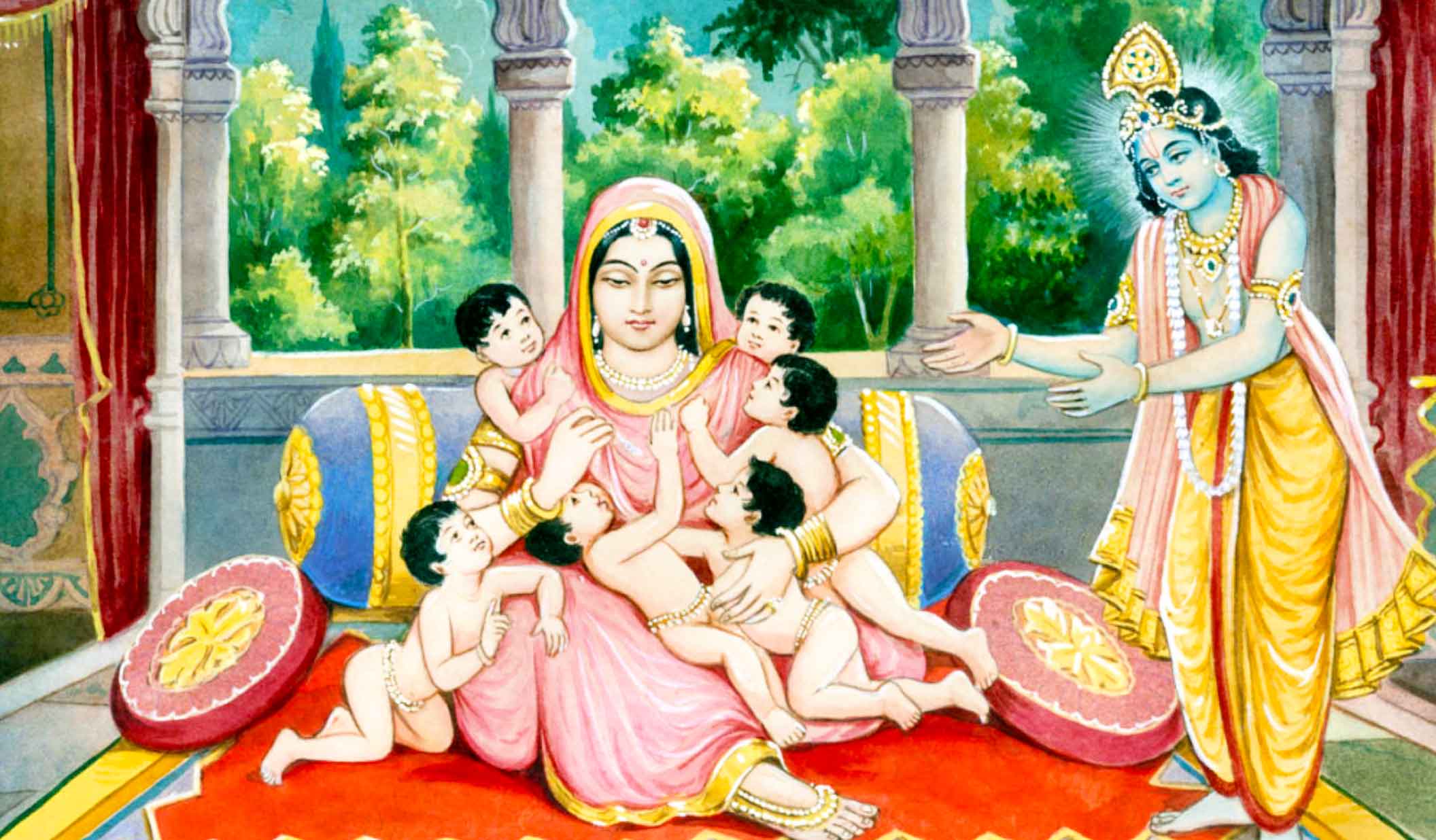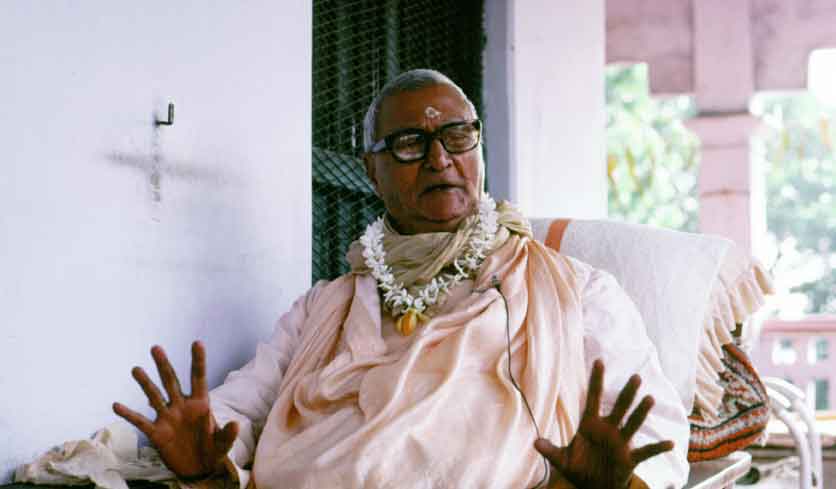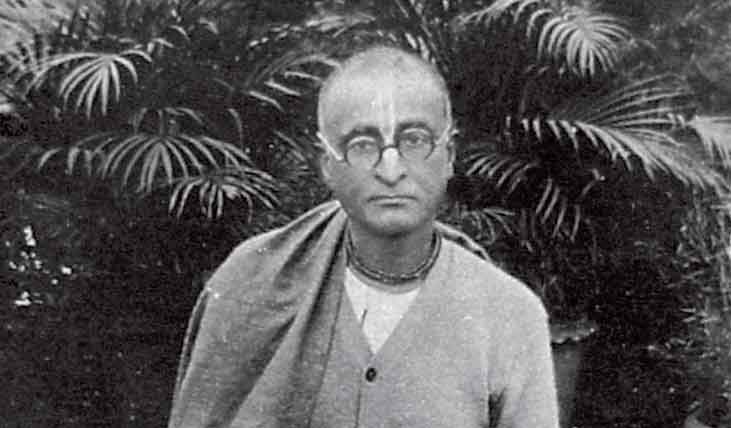Overview
In "The Secret of the Destruction of Devakī's Six Unborn Children' Śrīla Bhakti Pramoda Purī Gosvāmī Mahārāja narrates the back story of the six sons of Devakī and Vasudeva who met their end at the hands of Kaṁsa, and explains how they had been cursed in their previous lives by Hiraṇyakaśipu.
In the book Śrī Hari-vaṁśa (2nd chapter of the Viṣṇu-parva) it is written that Haṁsa, Suvikrama, Krātha, Damana, Ripu-mardana and Krodha-hantā, who are known as the ṣaḍ-garbha (six unborn children), are the sons of the demon Kālanemi. They performed intense austerities to worship the universal grandsire Brahma, unbeknown to their own grandfather Hiraṇyakaśipu. Brahmā, being satisfied with their extreme penances, granted them the boon of protection from death according to their prayers. Later, when Hiraṇyakaśipu heard about this incident, he became enraged and said, “You have worshipped Brahma without letting me know, thus I have no affection for impudent people such as you. Your father himself will kill all of you. In your next life all six of you will take birth in the womb of Devakī and your father Kālanemi will be born as Kaṁsa. That very Kaṁsa will be your murderer.” Due to this curse of Hiraṇyakaśipu they took birth in the womb of Devakī and were killed by Kaṁsa, the incarnation of Kālanemi.
Prior to this, they were well known by the names Smara etc. and were the sons of Marīci Muni. They laughed after seeing the universal grandsire Brahmā running after his own daughter. Due to this offence of looking down on a great personality, they had to take birth as demons.
In the Śrīmad Bhāgavata (10.85.47-57) it is mentioned that due to the prayer of Mother Devakī, Śrī Rāma and Śrī Kṛṣṇa brought back her six dead sons from Śrī Balirāja’s Sutalapurī:
āsan marīceḥ ṣaṭ putrā ūrṇāyāṁ prathame ’ntare
devāḥ kaṁ jahasur vīkṣya sutaṁ yabhitum udyatam
tenāsurīm agan yonim adhunāvadya-karmaṇā
hiraṇyakaśipor jātā nītās te yoga-māyayā
devakyā udare jātā rājan kaṁsa-vihiṁsitāḥ
sā tān śocaty ātmajān svāṁs ta ime ’dhyāsate ’ntike
ita etān praṇeṣyāmo mātṛ-śokāpanuttaye
tataḥ śāpād vinirmaktā lokaṁ yāsyanti vijvarāḥ
smarodgīthaḥ pariṣvaṅgaḥ pataṅgaḥ kṣudrabhṛd ghṛṇī
ṣaḍ ime mat-prasādena punar yāsyanti sad-gatim
This means that after going to Sutalapurī Śrī Kṛṣṇa told Bali, the king of the Daityas, “O lord of the Daityas, during the manvantara of Svāyambhuva, six demigod-like sons were born in the womb of Ūrṇā Devī, the wife of Mahāṛṣi Marīci. Seeing Brahmā running after his own daughter (namely Sarasvatī) they mocked him. As a result of this sin – hiraṇyakaśipu sākṣāt kālanemi-kṣetre – they took demoniac births as the sons of Kālanemi who was the son of Hiraṇyakaśipu. Again from there they were forced to take birth in the womb of Devakī through Yogamāyā and killed by Kaṁsa. Mother Devakī is mourning for them, considering them to be her own sons. Presently they are residing in your abode. To alleviate her maternal sorrow I will take them away from this place to meet their mother. Finally, they will go back to the planets of the demigods having been freed from their curse and from lamentation. These six sons of Marīci namely Smara, Udgītha, Pariṣvaṅga, Pataṅga, Kṣudrabhṛta and Ghṛṇī will eventually attain the Supreme Abode by My mercy.”
Now, if we go back to the aforementioned incident, a question arises,” How is it possible that six mundane children could enter the womb of Mother Devakī, who is the personification of pure goodness (śuddha-sattva), who manifests the Supreme Lord and is the embodiment of the greatest potency?”
In this regard Śrīla Viśvanātha Cakravartī Ṭhākura refers to the previous incident and himself concludes:
Although the entire expanse of the material world is situated within Śrī Bhagavān, who is the very personification of truth and pure goodness, still it is separate in existence – it is not directly connected to Him. Similarly the entrance of the six children into the womb of Devakī should also be considered in that manner.” Bhagavān says in the Gītā:
mat-sthāni sarva-bhūtāni na cāhaṁ teṣv avasthitaḥ
na ca mat-sthāni bhūtāni paśya me yogam aiśvaram
(Gītā 9.4-5)
“All the living beings in material existence are situated within Me, the personification of consciousness, but I am not situated in them. Again, all the living beings in material existence are not situated in My pure personal form (śuddha-svarūpa). Everything is situated under the influence of My illusory energy. This is due to My inconceivable mystic opulence.”
It cannot be harmonised by the intelligence of ordinary jīvas. To display the fullness and completeness of bhakti, all these inconceivable pastimes of Śrī Bhagavān are manifested. Therefore, the real significance of this is – the symptoms of devotion such as śravaṇa, kīrtana etc. reside within the devotees. Within that womb based on its fruitive results are the six desires of material enjoyment that are its companions (the five knowledge-acquiring senses and the mental faculty). “Alas, all these will drag me into the dark well of material life”– when such fear arises in the heart of a devotee, the desire for material enjoyment will be vanquished in time, then the glories of the Lord, namely the devotional cultivation of hearing and chanting, attains immense maturity. Only at that stage of mature devotion will Bhagavān with His form, quality and pastimes appear. Bhakti is the personification of pure goodness and reveals the Supreme Lord. Even the words of the śruti support this – bhaktir-evainaṁ darśayati etc. meaning that only devotion can reveal Bhagavān. Because the śruti states that, ‘Marīci manifests from the mind’ we may take it that Marīci is an incarnation of the mind. Marīci has six sons; hence they are the six sense objects of mental enjoyment (sound, touch, form, taste, smell and thought). Since Śrī Bhagavān appears from Devakī she is considered the avatāra of bhakti – the very personification of devotion. Because the śruti states, bhayat Kaṁsah (‘the fear within Kaṁsa’), Kaṁsa is the personification of fearfulness, hence Kaṁsa is the avatāra of fear. Therefore, just as fear of the material world destroys the six material sense objects from the womb of bhakti, similarly Kaṁsa kills the six children of Devakī. The well-wishing mother of prema-bhakti arises along with the glories of the Supreme Lord within the womb of devotion when material desires are extinguished Similarly, when the six sons of Devakī are eliminated, one should know that the seventh child appears as Anantadeva, who manifests as the abode, the resting place and the paraphernalia such as the bed, umbrella etc. of the Supreme Lord. Just as the Supreme Lord Himself appears after the appearance of prema-bhakti, so Śrī Bhagavān directly appears as the eighth son of Devakī. This is the purport of the appearance of the Supreme Lord within the womb of Devakī.
Sattvaṁ viśuddhaṁ vāsudeva śabditaṁ – pure goodness is known as Vāsudeva. This Vāsudeva self-manifests as the Supreme Lord Vāsudeva. In the Śrīmad Bhāgavata 1st Canto, 2nd Chapter:
śṛṇvatāṁ sva-kathāḥ kṛṣṇaḥ puṇya-śravaṇa-kīrtanaḥ
hṛdy antaḥ stho abhadrāṇi vidhunoti suhṛt-satām
“Śrī Kṛṣṇa, who resides within everyone’s heart and is the benefactor of the truthful devotee, cleanses the desires for material enjoyment from the heart of that devotee who has developed the urge to hear His messages, which are in themselves virtuous when properly heard and chanted.” (Bhāg. 1.2.17)
naṣṭa-prāyeṣv abhadreṣu nityaṁ bhāgavata-sevayā
bhagavaty uttama-śloke bhaktir bhavati naiṣṭhikī
“By regularly serving the Bhāgavata, all that is troublesome to the heart is almost completely destroyed, and devotion unto the Supreme Lord, who is praised with choice verses, is fully established.” (Bhāg. 1.2.18)
tadā rajas-tamo-bhāvāḥ kāma-lobhādayaś ca ye
ceta etair anāviddhaṁ sthitaṁ sattve prasīdati
“At that time, one is not affected by the modes of passion and ignorance, such as lust and greed. Then the mind is established in goodness, and becomes fully satisfied.” (Bhāg. 1.2.19)
evaṁ prasanna-manaso bhagavad-bhakti-yogataḥ
bhagavat-tattva-vijñānaṁ mukta-saṅgasya jāyate
“Thus, the man enlivened by devotion to the Lord is freed from material association, and comes to know realise the truth concerning of the Supreme.” (Bhāg. 1.2.20)
If we discuss all these verses we come to know this – through the auspicious process of chanting and hearing, Kṛṣṇa, the well-wishing friend of the devotees, enters the heart of those who hear His name, form, qualities and pastimes and eliminates all mundane desires of material enjoyment that are present as sin within the heart. Under the care of the devotee Bhāgavata and regularly hearing the book Bhāgavata from the mouth of that devotee, anarthas are eliminated in time. At that stage steady devotion (niṣṭhā), devoid of any mental disturbance, arises towards the Supreme Lord Śrī Kṛṣṇa, who is glorified by select verses. Then mental disturbances arising out of the modes of passion and ignorance and obstacles to bhajana such as lust, anger, greed, illusion, madness, envy etc. are eradicated with the manifestation of taste towards hearing topics about Kṛṣṇa and other devotional activities. Under the growing influence of the mode of goodness, the realisation of the living entity continuously increases, and in the association of saintly personalities, continuously cultivating Kṛṣṇa consciousness leads to attraction towards the Supreme Lord, the personification of pure goodness. His mind attains satisfaction when it becomes fixed in pure goodness. In this way by the influence of Bhāgavata-bhajana (worship of the Bhāgavata), the consciousness becomes content mukta-saṅga means that the sādhaka, being free of material desires such as lust etc. realises the truth concerning the Bhāgavata or meets the Bhāgavata directly. With intense attachment, if one performs kṛṣṇa-bhajana at every moment, then the influence of kṛṣṇa–bhajana-rati (a taste or inclination towards Kṛṣṇa) arises within him and his mind becomes free from the influence of matter and achieves real satisfaction. After this, prema-bhakti gradually increases until prema reaches maturity when one feels or realises the personal qualities, pastimes, opulence and sweetness of the reality of the Supreme Lord. This realisation or feeling has been called sākṣātkāra by Śrīla Jīva Gosvāmīpāda, referring to the Bhāgavata śloka (1.2.7):
vāsudeve bhagavati bhakti-yogaḥ prayojitaḥ
janayaty āśu vairāgyaṁ jñānaṁ ca yad ahaitukam
“By rendering devotional service unto the Supreme Lord Vāsudeva one immediately acquires causeless knowledge and detachment from the world.”
Devotional renunciation and the causeless attainment of knowledge mentioned here are in tandem with the aforementioned Bhāgavatam verse (1.2.20). Mukta-saṅgasya means the renunciation and realisation concerning the truth of the Supreme that results from coming directly in connection with the Supreme Lord. When attachment arises towards Bhagavān, the mind is free from the influence of material desires. Until one develops distaste towards material things, realisation concerning the truth about the Lord, or directly experiencing His presence is not possible. Śrī Kṛṣṇa’s appearance does not become the subject of realisation in the heart. Without understanding the appearance of Kṛṣṇa, the life of the living entity is in vain.
avismṛtiḥ kṛṣṇa-padāravindayoḥ kṣiṇoty abhadrāṇi ca śaṁ tanoti
sattvasya śuddhiṁ paramātma-bhaktiṁ jñānaṁ ca vijñāna-virāga-yuktam
“For one who remembers the lotus feet of Kṛṣṇa, all inauspiciousness soon disappears, and one’s good fortune expands. In other words, one becomes free from all material contamination, one attains liberation from repeated birth and death, and one’s real spiritual life begins. As one’s heart becomes gradually purified, one’s devotion for the Lord within the heart awakens, and one realises the Paramatma. Thus one gradually develops knowledge, realisation and renunciation” (Bhāg. 12.12.55)
In this śloka of Śrī Bhāgavata the same meaning is also repeated. Therefore:
sādhu-saṅge kṛṣṇa-nāma ei mātra cāya
bhajite bhajite kṛṣṇa-pāda-padma pāya
“The only thing required is chanting the holy name of Kṛṣṇa in the association of saintly devotees. By worshipping continuously, one obtains the lotus feet of Kṛṣṇa.”
Śrīla Narottama Ṭhākura Mahāśaya has sang this prayer in the beginning of his Prārthanā:
āra kabe nitāi-cāṅdera karuṇā ha-ibe
saṁsāra-vāsanā mora kabe tuccha habe
viṣaya chāḍiyā kabe śuddha habe mana
kabe hāma heraba śrī-vṛndāvana
“When will Nitāi-cāṅda show His mercy to me? When will I feel the desire for material life to be insignificant? When will my mind be purified by rejecting material thing? When will I be able to see Śrī Vṛndāvana?”
This prayer has been sung thus. Śrī Baladeva is the very personification of the sandhinī-śakti that expands spiritual consciousness everywhere. Being non-different from his personal manifestation, in the form of Śrī Guru, He delivers the message of Kṛṣṇa for the aural reception of the living entities to purify their consciousness and free them from material contamination. Until this happens, the living entity will not develop eagerness to have darśana of the spiritual Vṛndāvana-dhāma and the lotus feet of Kṛṣṇa, the master of the dhāma.
guru-kṛpā-jale nibhai viṣaya anala
“By the water of the mercy of Śrī Guru I am able to extinguish the fire of material existence.’ (Gītāvalī 5.2)
visaya anale jvālice hṛdaya anale bare anala
sādhu-saṅga kari hari bhaje yadi anale pade ta jala
“The blazing fire of material existence is burning the heart, and that fire is always increasing. If one associates with saintly persons and performs bhajana of Hari, then such activities act like water and extinguishes that fire.”
The sermons of pure devotional principles coming forth from the mouth of Śrī Guru will extinguish the fire of material existence and simultaneously urge the core of the heart to cry out, “Where is my Vṛndāvana? Where are the lotus feet of Rādhikā? Where is the treasure of the life of Rādhā, the life of the gopīkas, Śyāmasundara, the son of Yaśodā?” When the mind is still contaminated by the filth of material desires, this intense cry does not arise in the heart.
Until and unless we start crying like this – with intense hankering, with tears in our eyes and under the shelter of Śrīman Mahāprabhu who is in the mood of vipralambha:
kāhāṅ kṛṣṇa prāṇa-nātha muralī-vadana
kāhāṅ jāṅ kāhāṅ pāṅ vrajendra-nandana
“Where is Kṛṣṇa, the Lord of my life, the one who plays the flute? What can I do to find him? Where is the son of Nanda?” (Cc. Madhya 2.15).
– then we cannot get Him. Bhaktasya bhajanottha śrantis tad-darśanottha kṛṣṇa-kṛpā – without the combination of the devotees personal effort and the Lord’s mercy, the rope that binds Him will always be two fingers too short.
Guru-kṛpā hi kevalam (Only the mercy of Śrī Guru can make it possible).
Prema Dhāma Deva Stotram with the Narasiṅgha Sevaka Commentary – Verses 61-65
In verses 61 to 65 of 'Prema Dhāma Deva Stotram', Śrīla Śrīdhara Mahārāja narrates the pastime of Śrī Caitanya at Caṭaka Parvata In Purī and explains how the scriptures produced by Brahmā and Śiva are ultimately searching for the personality of Mahāprabhu who is merciful too all jīvas, no matter what their social position.
Prabhupāda Śrīla Sarasvatī Ṭhākura’s Visit to Ayodhyā
With the forthcoming observance of Śrī Rāma Navamī, we present 'Prabhupāda Śrīla Sarasvatī Ṭhākura’s Visit to Ayodhyā' written by Śrīla Bhaktisiddhānta Sarasvatī Ṭhākura Prabhupāda from The Gaudīyā magazine, Vol 3. Issue 21/ In December 1924, after visiting Benares and Prāyāga, Sarasvatī Ṭhākura visited the birth-site of Śrī Rāmācandra in Ayodhyā.
Śaraṇāgati – The Only Path to Auspiciousness
In this article, 'Śaraṇāgati - The Only Path to Auspiciousness', Dhīra Lalitā Dāsī analyses the process of śaraṇāgati (surrender) beginning with śraddhā (faith). She also discusses the role of śāstra and the Vaiṣṇava in connection with surrender.
Ātma Samīkṣā – The Value of Introspection
In this article, "Ātma Samīkṣā – The Value of Introspection" Kalki Dāsa highlights the importance of introspection in the life of a devotee and especially in relation to the worldly environment that surrounds us. He also explains how transcendental sound influences our capacity to introspect.
Prema Dhāma Deva Stotram with the Narasiṅgha Sevaka Commentary – Verses 61-65
In verses 61 to 65 of 'Prema Dhāma Deva Stotram', Śrīla Śrīdhara Mahārāja narrates the pastime of Śrī Caitanya at Caṭaka Parvata In Purī and explains how the scriptures produced by Brahmā and Śiva are ultimately searching for the personality of Mahāprabhu who is merciful too all jīvas, no matter what their social position.
Prabhupāda Śrīla Sarasvatī Ṭhākura’s Visit to Ayodhyā
With the forthcoming observance of Śrī Rāma Navamī, we present 'Prabhupāda Śrīla Sarasvatī Ṭhākura’s Visit to Ayodhyā' written by Śrīla Bhaktisiddhānta Sarasvatī Ṭhākura Prabhupāda from The Gaudīyā magazine, Vol 3. Issue 21/ In December 1924, after visiting Benares and Prāyāga, Sarasvatī Ṭhākura visited the birth-site of Śrī Rāmācandra in Ayodhyā.
Śaraṇāgati – The Only Path to Auspiciousness
In this article, 'Śaraṇāgati - The Only Path to Auspiciousness', Dhīra Lalitā Dāsī analyses the process of śaraṇāgati (surrender) beginning with śraddhā (faith). She also discusses the role of śāstra and the Vaiṣṇava in connection with surrender.
Ātma Samīkṣā – The Value of Introspection
In this article, "Ātma Samīkṣā – The Value of Introspection" Kalki Dāsa highlights the importance of introspection in the life of a devotee and especially in relation to the worldly environment that surrounds us. He also explains how transcendental sound influences our capacity to introspect.








